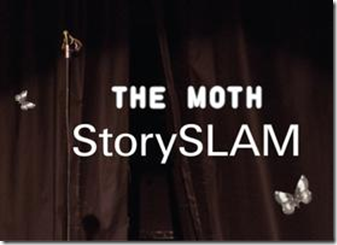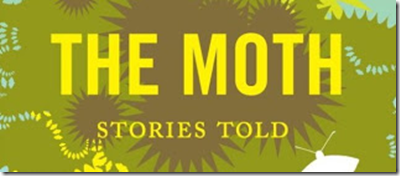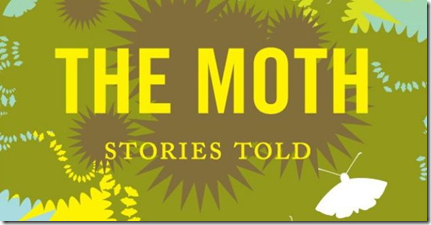The Moth: Black and White in Washington
/The following is a story that I told at a Moth StorySLAM at Housing Works in New York City earlier this year.
The theme of the night was Summer. I told a story about my pursuit of a girl while working in Washington DC and the unexpected and unfortunate turn that it ultimately took.
I finished in first place.
My daughter is tougher than a thousand Moth judges.
/I competed in a Moth GrandSLAM at The Music Hall in Williamsburg last night and finished in second place. Second place again. By a tenth of a point again.
The only consolation was that I lost to my favorite storyteller of all time, who has beaten me by a tenth of a point more than a few times in my Moth career. If I'm going to lose, I'd prefer to lose to him every time.
In truth, I was also pleased to have told my story well and to have held my own in a field of extraordinary storytellers. It was truly an all-star lineup.
When I woke my four year-old daughter up this morning, she yawned, wiped the sleep from her eyes and asked, “So? Did you win last night?”
“No, sweetie. But I came in second.”
She frowned and made a tiny raspberry sound. Then she sat up, looked me in the eye and said, “C’mon, Daddy. You always come in second place.”
Sometimes a little girl’s assessment of your performance in the privacy of her own bedroom can be tougher to handle than five teams of Moth judges in a room full of 500 people.
Lessons from another evening at The Moth: Storytellers’ reactions to a loss can differ greatly. Occasionally they suck.
/On Monday some friends and I attended a Moth StorySLAM at the Bitter End in New York. After winning six StorySLAMs in a row, my luck finally ran out. I was chosen to tell my story first and finished in third place.
Still, I told a good story about the time I moved my childhood bedroom from the second floor of our home to the basement without my parents knowledge, and anytime I am able to take the stage and tell a story, I am pleased.
An odd thing happened when telling my story:
At the end of my story, when my initially amusing story was supposed to take a sad turn, the audience continued to laugh. As I described how my parents took three days to realize that I had moved to the basement, and what this meant to me in terms of the amount of parental attention that I was receiving, the audience continued to laugh out loud.
It was strange.
This may have been the result of going first. Maybe the audience, which was comprised of many first time Moth attendees (it was a holiday week), didn’t know what to expect.
Or perhaps my story was so sad that it was funny.
Or maybe my delivery was simply off.
Audience members later told me how touching my story was, and a couple admitted to getting misty-eyed near the end, but the great majority thought the whole thing was hilarious.
Whatever the reason, it’s more than a little weird getting a little choked up on stage while the audience continues to laugh at you.
Going first always stinks.
I suggested later on to a friend that I might be willing to give up my right pinkie finger to avoid ever going first at another StorySLAM. While this might be a little crazy, it’s only a little crazy.
A few thoughts about storytelling that I took away from the night:
____________________________________
One of the best things about becoming a storyteller has been the number of friends who have subsequently taken a stage to tell a story as well. I invited Bill and Cheryl to their first Moth StorySLAM last spring, and in the fall, Bill took the stage at one of our Speak Up shows to tell a story. On Monday night, he took the stage and told his first story for The Moth.
He did great.
Since I started storytelling in July of 2011, I’ve had many of my friends take the stage at Speak Up and tell their stories, and a handful of them have taken the plunge and told stories for The Moth as well. It’s been incredibly rewarding to be able to introduce something new to my circle of friends and then watch them find the courage to try it as well.
I assume they must be thinking something like:
“If that idiot can do it, maybe I can, too.”
I’m so glad to have opened up this world to so many people.
Along similar lines, my wife and I produce our own storytelling show here in Hartford called Speak Up. In addition to the joy of entertaining audiences, it’s been incredibly rewarding to give fledgling storytellers, who may not be ready to tell a story at a place like The Moth, the opportunity to tell a story and hone their craft. Watching someone take the stage for the first time in their lives and bare their soul is an amazing thing to watch. I feel fortunate to have brought this opportunity to so many people already.
____________________________________
Storytellers have a variety of reactions to the competitive element of The Moth. Most experienced storytellers thrive on the competition, and at least a few (like me) would much prefer to tell stories in a competitive format.
Eliminate the pressure of competition and it simply isn’t the same.
But because this is storytelling, the judging is fairly subjective, and the judges are audience members who receive a few minutes of instruction before the competition begins. As a result, you can’t get too invested in the scoring, even though I do.
Despite these subjective factors, the scoring is almost always well done. I have always believed that if one of the top three stories of the night wins, the judges have done their well, and that has happened at every StorySLAM that I have ever attended.
But when a storyteller doesn’t win, reactions vary.
While I am often disappointed, I have always been an analytical, reflective, self-critical person. As soon as I step off the stage, I begin a mental analysis of my performance, and as the scores are announced, I compare these numbers to my personal assessment. I will spend hours after the StorySLAM evaluating my performance, and when I arrive home, I will record the results of my performance in a spreadsheet along my notes from the evening.
It’s a serious spreadsheet.
I also seek feedback from friends and fellow storytellers who have attended the performance, poking and prodding them for as much honesty as possible.
Though I am disappointed when I don’t win, I don’t think I should always win, and I always use the results to improve.
I don’t get angry. I get better.
In fact, the only time when this analytical reaction is muddied for me is when I have to tell my story first. Winning from the first position is almost impossible, as judges often assign lower scores to the first storyteller in order to give themselves some flexibility for upcoming storytellers. And “score creep” is a real thing. As the competition proceeds, it’s easy for judges to forget the first story in light of a great story told in eighth or ninth position.
It’s just a natural human reaction.
As a result, analyzing my scores from the first position is difficult. I’ve had to tell my story from the first position three times in my life, and I have finished those competitions in second, third and third place.
Could I have won any of those StorySLAMs had I not gone first?
Maybe? I really can’t tell.
Other than the incongruous first position results, my reaction to a loss has always been an obsessive desire to improve based upon the feedback provided.
Most storytellers are just happy to have the chance to take the stage and tell their story. Many are relieved that they didn’t embarrass themselves by falling apart in front of 300 strangers. Most consider the opportunity to tell a story reward enough. They care nothing about the scoring.
I don’t understand this sentiment, but I respect it.
There are storytellers, however, who become angry, despondent or belligerent when they lose or when their scores don’t reflect what they believe they deserved.
There aren’t many of these people, but there are enough. They are not enjoyable people to spend time with after a performance.
In the past, storytellers have told me that they can’t stand the subjectivity of the scoring and never want to take the stage again.
Storytellers have told me that they become depressed when they don’t score well and require a great deal of time to overcome a loss.
The most common negative reaction to a performance is to blame the judges and accuse them of incompetence. Storytellers will accuse the judges of favoritism based upon sex or race. They will complain that the judges favor one particular type of story over another. They will claim that judges lend greater credence to crowd favorites who take the stage often and who they have seen before. They will argue that judges don’t understand the rules of the competition or have misinterpreted the rules. They will assert that you need to be funny rather than simply a good storyteller in order to win a StorySLAM.
None of this is true, but I understand that in the heat of competition, it’s difficult to remain unemotional.
Still, I find this reaction distasteful at best. Blaming the judges may be an effective way of avoiding the reality of losing, but it only serves to make the storyteller look petty and insecure. It will never help a storyteller to improve.
In my experience, it is also a decidedly male reaction.
There is also a thankfully tiny number of storytellers who, upon losing, will accuse the winning storyteller of telling an untrue story. They may hint at this belief by questioning the details of the story or come right out and accuse the storyteller of fabrication.
While I am sure that there have been storytellers who invent stories for the stage, I have never heard a story that sounded untrue, and the thought that a storyteller had done such a thing has never crossed my mind.
I find this particular reaction especially repugnant.
It is also a decidedly male reaction.
A tale of two story slams
/On Thursday night, I performed alongside four other storytellers at The Wilbur Theater in Boston as part of a Moth Mainstage. We told stories to a sold out audience of 1,200.
It was an amazing night.
Last night I hosted a story slam at Word Up, a small, community bookstore in Washington Heights run by volunteers and stocked primarily with used books. Nine brave storytellers were courageous enough to stand on a makeshift stage of pallets and plywood to share their stories to an audience about about 40 people. Almost all were first-time storytellers.
It was also an amazing night.
The two events could not have been more different.
In Boston, five storytellers underwent weeks of revision and an evening of rehearsal with experienced and skilled producers in preparation for the event. We arrived at the theater early for a sound check and publicity photos. We enjoyed food and drink in a well-appointed green room, which was adjacent to the green room of Saturday Night Live star and future host of the Tonight Show Seth Meyers, who was taking the stage immediately after us.
Last night’s storytellers did not revise and rehearse their stories with talented producers. They did not have a mic check prior to the show, and as a result, they fought with the microphone stand all evening long. There was no green room. There was no Seth Meyers.
Two completely different shows in terms of scale and sophistication, yet I’m not sure which was better.
Yes, the stories in Boston were more polished, and the storytellers were better prepared and more poised onstage. The audience was enormous and enthusiastic. The laughter and tears were more plentiful.
But the storytellers in Washington Heights were incredible, too, despite their overall inexperience. They were honest. Compelling. Revealing. Amusing. Diverse. Surprising. At least two of their stories were more than capable of winning a Moth StorySLAM.
If given the choice, I’d always choose the audience of 1,200 over the audience of 40, but in the grand scheme of things, the size your audience or the opulence of your venue are irrelevant. In the end, it’s about the stories and the people willing to share them.
Everything else is window dressing.
Marital advice courtesy of a Moth StorySLAM victory
/A friend and I attended The Moth’s StorySLAM at the Bitter End last night. He’s about 15 years younger than me, and while we waited in line outside the club, we talked about his recent experiences with dating in New York. I advised him that above all else, he should avoid getting married before the age of 30.
“It’s the best advice I can give you when it comes to getting married,” I said. “If I look at the people who I know who got married before 30 and the people who got married after 30, the after-30 crowd tends to be much happier in their relationships.”
Later on in the night, I was fortunate enough to have my name was drawn from the tote bag. I took the stage and I told my story, and I was fortunate enough to win.
It’s my fifth StorySLAM victory in a row, which is an incredibly lucky streak. While my performances have all been solid, many other factors come into play when competing in a Moth StorySLAM, including the order that your name is chosen from the bag, the storytellers whose names are not drawn that night and the demographics of the judging teams.
I’m not attempting to be humble in any way by saying that winning five in a row requires an enormous amount of good fortune.
Still, my performances had to be good, too.
After leaving The Bitter End, I texted the good news to my wife, and she texted three words back to me:
You are unbeatable.
I turned to my friend. “Forget my over-30 advice. It still applies, but I have something better. Find a girl who you want to spend the rest of your life trying to impress.”
I turned the phone to him so he could see my wife’s text.
“Find a girl who can say something like this to you and make you forget everything that anyone else has ever said to you. Find someone whose words mean more to you than anyone else. When the happens, you’ll know you’ve found the right girl.”
Winning five StorySLAMs in a row has been a wild ride that will surely never be repeated, but those three words that my wife texted to me last night means more than all my victories.
Ten years after we started dating and seven years into our marriage, and I’m still trying like hell every day of my life to impress the girl who became my wife.
That is the key to a successful marriage.
Moth Radio Hour appearance!
/Exciting news! One of the stories that I told onstage for The Moth’s GrandSLAM championship last year has been chosen for The Moth Radio Hour this week. It will be airing on over 250 stations nationwide from Wednesday through Sunday.
The show will be airing in the Hartford area on WNPR at 9:00 PM on Sunday.
It’ll be airing in New York City on 93.9 WNYC on Wednesday night at 8pm, Saturday at 2pm, and then on WNYC's AM station, 820, on Saturday at 7pm.
It will be airing in Los Angeles on KPCC Sunday at 11am, on Chicago Public Radio Saturday at 2pm, and on WBUR and WGBH in Boston on Thursday at 9pm, and Saturday at 2pm, respectively.
If you are in a market not mention, click here to see if it’s airing in a city or town near you.
You can also listen to the episode online as well on The Moth Radio Hour website.
Just as exciting, this episode of The Moth’s Radio Hour will also be featured as The Moth’s weekly podcast, which is how I was first introduced to The Moth and live storytelling three years ago. The Moth podcast has more than 70,000 subscribers and is downloaded more than a million times each month. If you’re not already listening, I can’t recommend it enough.
You can download the episode featuring my story starting on Tuesday from iTunes or whatever service you use to listen to your podcasts.
September storytelling
/A few upcoming events for anyone interested:
I'll be telling a story on Friday evening at 7:00 at the Mark Twain House for The Mouth, a storytelling organization run by NPR's Chion Wolf. The theme of the night is Luck and Serendipity. Tickets are $5 and can be purchased via the Mark Twain House's website.
Our second Speak Up storytelling event is on September 28 at 7:00 at Real Art Ways in Hartford. This event is free of charge. Eight storytellers, including myself, will be telling true stories on the theme Schooled: Lessons Taught and Lessons Learned. We have an exciting lineup of storytellers, including local talent as well storytelling veterans from New York City who are making the trek to Hartford to entertain us.
My wife, Elysha, is emceeing the event.
If you plan on coming, please let us know via our Facebook page.
I’ll also be attending The Moth’s StorySLAM on Monday, September 30 at The Bitter End in New York City with hopes of telling a story on the theme Promises.
My storytelling secret: I’m a small, frightened man onstage. Always.
/I’m off to New York tonight to compete in another Moth StorySLAM. I have been exceptionally fortunate enough to win the last five StorySLAMs in which I have competed, including my last four in New York.
I am not attempting to be humble in any way when I describe this recent streak of consecutive victories as exceptionally fortunate. A great number of factors come into play when competing in these events. In addition to a storyteller’s actual performance, the order that the names are chosen from the hat plays an enormous role. You can tell the best story of the night, but if you are the first or even second storyteller of the evening, you have almost no chance of winning.
The judging is also very subjective. While the judges typically do an excellent job, the difference between the winning story and the second or third place story is often slim.
Sometimes nonexistent.
So a story that may have easily won in last week’s competition might not place second or third the following week, depending on who has been chosen to judge and the level of competition.
It’s also extremely helpful when the names of some of the best storytellers in the house remain in the hat, as was the case when I won last week. When three champion storytellers are unable to the the stage because of bad luck, your chances of winning increase considerably.
You need to tell a good story, but you need some luck on your side, too.
I’ve been telling stories for The Moth for two years now. I’ve told stories in 20 StorySLAM competitions so far and won 10 of them. I’ve done well and am admittedly proud of my success.
But here is the truth:
Last night a friend said to me, “It must be exciting winning all of these competitions in a row. You probably want to win tomorrow night and keep your streak alive. Huh?”
While it’s true that I would love to win tonight’s competition, the real truth is that as much as I always want to win, I’m much more worried about not making a fool of myself onstage. No matter how many times I take that stage and tell a story, and no matter how many times I win one of these competitions, the possibility that I will stand before that microphone and make an idiot of myself remains my primary concern.
It’s odd. I love storytelling, and I especially love storytelling for The Moth. I love the audiences and my fellow storytellers and the competitive aspect of the event. I love it all. I would take the stage every night and tell a story if I could, and yet it still scares the hell out of me. Perhaps a little less now than it did my first night two years ago, but when I am telling a story, I feel like I am walking on a high wire.
If I perform well, I have the chance to thrill an audience.
But there is also the ever-present possibility that I will fail, and if so, I will fail in front of an audience who were depending on my to entertain them for five minutes. Even worse, I will fail in the midst of sharing something meaningful or intimate about myself.
So if you see me on stage tonight or at any point in the future and think I look exceptionally poised and confident in the midst of my performance, please remember that there is also a small, frightened man on the stage as well, hoping like hell that the audience will like him and terrified that he will fail miserably.
Credit this blog for last night’s Moth StorySLAM victory
/When I started blogging in 2004, people thought it was silly. They believed that it represented an unpolished, unprofessional form of writing that would go unread and unnoticed and eventually go away. They thought it a fad. A burst of digital narcissism.
In 2007, blogging had begun to gain more mainstream acceptance, but the perception remained that most blogs were written by loners and losers who were sitting at desks in their underwear.
2007 was also the year that blogging nearly destroyed my life. A long story for another day. A story I once told on a Moth stage.
By 2010 blogging had become an accepted and valued form of personal expression and serious journalism. Authors were encouraged to blog in order to build their platforms. The media turned to blogging as a means of getting information out faster and more seamlessly. Readers turned to blogs as replacements for the dying newspaper and magazine industry.
Today, blogging is viewed as a valid and valued form of written communication, news distribution and self expression.
I have been blogging consistently, almost daily, for almost ten years. This blog is my third. While my previous two blogs no longer exist on the Internet, I retain the material written on those blogs. My archive of posts, as a result, is almost a decade long.
I write my blog for several reasons:
1. It provides me with a means of expressing ideas, thoughts and experiences with an audience of engaged readers.
2. It connects me with people who I might otherwise have never known.
3. It serves as a laboratory where I can test new ideas before committing them to something more formal and traditionally published.
4. It provides a record of my life.
This last reason is an important one for me. Though I don’t often write about my day to day experiences, I do so when the moments are important or unique enough to warrant a mention. As a result, I have an extensive archive of the events from my life that I can return to again and again when needed.
Last night I was fortunate enough to win another Moth StorySLAM at Housing Works in Manhattan. I told a story about the day I intervened in a fight between two men outside my gym. When I saw that the theme of the night was Interference, the fight outside the gym immediately popped to mind as a perfect fit for the theme. But I also found myself unable to recollect the specifics from that morning. I couldn’t remember enough of the story to reliably tell it onstage, so for a few days, I searched for another story from my life that would fit the theme.
Then it occurred to me (while in the shower, of course) that I had written about that fight on my blog, almost immediately after retuning home that day. While I was sure that it wasn’t a perfectly crafted story suited for a Moth stage, I thought that the post might contain enough details to sufficiently refresh my memory.
I was right. The fight took place more than two years ago, but I found the post and all the long lost details that I required to prepare the story for a Moth performance.
The A-Team tee shirt that one of the guys was wearing. The dialogue that we exchanged pre and post fight. My post-fight panic attack. All were details long since forgotten that came rushing back to me while reading the post. In fact, reading the post returned me to that morning in a way I didn’t think possible. I was able to remember even more about the fight, and especially my feelings about the fight, than even the post itself contained.
I was lucky to win last night. Some exceptionally strong storytellers did not have their names drawn from the hat.
But I am also lucky enough to have a detailed account of so many of the odd and unique moments from my life. It’s an archive that I can turn to again and again when I need to recall a story but my memory is failing me.
Specific details and the emotions of a moment are so critical to crafting and telling a successful story. Many times I can remember these elements with perfect accuracy. Other times, they are lost to the abyss of time. But as long as I continue to write for my blog on a daily basis and capture these moments in ones and zeros, I can reach down into that abyss and extract the information needed to craft a complete story.
I mentioned how lucky I felt to win last night competition to a fellow storyteller. He reminded me that luck favors the prepared.
I feel like I had been preparing to tell last night’s story for a long time. At least as far back as February of 2011, when I wrote the story down, and perhaps as far back as 2004, when people scoffed at the idea and laughed at the notion that I was writing a blog that no one would ever read.
Last night served as a big, fat “I told you so” to all those doubters and disbelievers.
The Moth: The Robbery
/The following is a story that I told at a Moth GrandSLAM at Music Hall in Williamsburg earlier this year.
The theme of the night was The Tipping Point.
I told a story about the time that I was robbed at gunpoint. I finished in second place.
Why I love storytelling, and why I especially love The Moth
/Ever since I told my first story live back in July of 2011 at the Nuyorican Poet’s Café in New York City, I’ve fallen in love with storytelling. On Thursday night I was fortunate enough to win another Moth StorySLAM, my second in a row and sixth overall.
Here’s what I love about live storytelling so much:
Back in April of this year, I completed my fourth novel. I also wrote my first short story in more than a decade.
My novel is scheduled for publication in the fall of 2014. A handful of people have read the first draft, and I expect to hear from my editor soon about revisions (though I’m sure it’s already absolutely perfect). But the vast majority of readers will have to wait more than a year to read the book.
I submitted the short story to a literary magazine. I should receive a response in September. I have no idea when it would be published if accepted.
That’s a minimum of a 17 month wait for the novel and a 5 month wait on the short story.
On Monday I wrote a story about the time a girlfriend and I went to the Virginia State Fair to see a two-headed cow.
I revised the story on Tuesday and Wednesday and then told the story to Elysha on the drive to New York on Thursday. She assisted with further revisions, making suggestions for sections to cut and assisting me with word choice to maximize humor.
About an hour before the StorySLAM, I walked about 40 blocks over to Housing Works from my sister-in-law’s apartment in midtown, speaking and revising the story along the way. I actually removed a large chunk of the story during my walk after realizing that I wasn’t going to be able to keep the story under six minutes. I texted Elysha to see if she approved of the change, and she did.
About two hours later, I took the stage and told my story.
When I was finished, the audience’s reaction instantly told me how I had performed. I didn’t know if I would win the competition, but I knew that my hard work had paid off. The volume of their applause and cheers instantly told me that I had done well.
The judges confirmed the audience’s opinion by awarding me with high scores, and I was fortunate to maintain my lead throughout the night.
Immediate feedback. That’s what I love about storytelling. I prepare a story over a period of a week or so and then receive immediate feedback about my performance in the form of audience response, and in the case of The Moth, numerical scores.
Having grown up playing a lot of videogames, I’m the kind of person who wants to know how I’m doing at all times. I want to know my score, my opponent’s score, the all-time highest score and everything in between.
Storytelling, and especially competitive storytelling, affords me that opportunity. When I have finished telling a story onstage, I know exactly where I stand.
It’s the lack of immediate feedback that makes novels and short stories so challenging. Even when my next novel publishes in the fall, the response from readers will trickle in over the course of a year or more.
Granted the novel allows me to reach more readers, and in the case of my last book, in more than 20 countries around the world. but the waiting is hard. Many authors will tell you that it’s one of the hardest part of writing.
When I have a story to tell, fiction or nonfiction, I don’t want to wait to share it with my readers. I want to tell it now. Have it heard now. Receive feedback now.
Storytelling fulfills this need while I wait for my other stories to wind their way through the agonizingly slow cogs of the publishing world.
My wife played an enormous role in my recent Moth StorySLAM victory. Here’s how.
/On Tuesday night I told a story at a Moth StorySLAM at Housing Works in New York City and was fortunate enough to win.
On Facebook and Twitter, I expressed gratitude to my wife for the role she played in helping me to craft the story. A lot of people responded with questions like “How does that work?” and “What did she do to help?” and “Did you perform for her in the living room?”
They were genuinely curious about how we collaborate on projects like this, so I thought I’d explain a little bit about how Elysha and I work.
Let me begin by saying that I am fortunate to have someone as involved in my creative life as my wife. My friend, Kim, has always said that the most important decision you will ever make in life is your choice of spouse.
She couldn’t be more correct. Not only is Elysha willing to be involved, but she is skilled and intelligent in her approach to creativity, too. So much of my success is the result of her influence on my work.
I have won a total of 5 Moth StorySLAMs during my two years of storytelling, and Elysha has been involved in 4 of those victories (and many, many second place finishes). In one instance, she actually convinced me to change the story I was planning to tell about five hours before the show. I thought she was crazy, but she was adamant. After some moments of indecision, I took her advice and prepared an entirely different story during my lunch break.
And I won. It was probably the best story I’ve ever told.
I’ve learned to listen to m wide whenever possible.
The theme of Tuesday’s StorySLAM was Summer. My story was about a doomed romance during the summer of 1993.
I didn’t perform the story for Elysha in the truest sense of the word because I don’t memorize my stories. They are always true stories from my own life, so I don’t worry about getting lost or mixed-up during my performance. I actually did these things, so I should damn well remember what happened.
I also like the organic nature of storytelling that comes from a story that is not memorized or overly prepared. It allows me to make adjustments on stage, pushing or pulling back on certain aspects of the story based up audience reaction. If the humor isn’t playing well, I can shift to the heart. If the audience thinks I’m hilarious, I can take some risks and push the humor even more.
In at least two instances, I found entirely different and much better endings to my stories in the midst of telling them. In one case, I returned to my seat and Elysha asked if I’d been keeping the real ending to the story a secret from her for some reason.
“No,” I said. “I found it while I was up there.”
At another non-Moth performance, I found a way of turning a sad ending into a funny one. The producer of the show, who had vetted my story beforehand and knew it well, was backstage and not really listening to my performance. When the audience erupted into laughter and I turned to leave the stage, she asked, “What happened?”
“I found a better ending,” I told her.
Had I relied on memorization, I don’t think either of these moments of unexpected discovery could’ve happened.
As a result, every time I tell a story, it sounds a little different, so performing for Elysha in the living room would be silly and unproductive.
It would make me feel silly, too.
But even without memorization, I do have some strategies to get me through the story:
- I find important transition points in stories and memorize those specific sentences so I have stepping stones to the end.
- I find moments of potential humor and try to find the funniest way of delivering those lines.
- I memorize my first 2-3 sentences of my story.
- I try to memorize my last line of my story, though that last line often changes while onstage.
I don’t write my stories down anymore, and I don’t time them before the performance. Writing them down has become unnecessary. If I simply run through the story in my mind dozens of times and consistently hit those stepping stones, I’m much better prepared than if I had a sheet of paper in front of me.
The Moth’s 5 minute time limit stressed me out when I started telling stories, but after two years, I’ve developed an innate sense of what a 5 minute story sounds like, and since I don’t memorize the story, I can always edit the story if needed once I receive the first warning bell.
I do almost all my thinking about my stories in the shower now. It sounds crazy, but it’s where I do my best work. It takes about a week’s worth of showering to finalize my story in my mind, and only then do I tell Elysha the story, usually while I am driving.
It makes me feel less self-conscious than simply staring at her and telling the story at the kitchen table.
But rather than telling her the story, I speak about the story aloud. I start to tell the story, usually getting through the first few lines, but then I stop in order to explain what I’m trying to achieve with a specific line or bit of detail, and I ask her to think about whether or not it’s working. Or she stops me to ask a question or comment on something. I think through my story as I tell it to her, including her on the internal debates I’ve been having over how to deliver a line, how to transition through time or space, and what to add or remove. I rarely tell her the story straight through.
Instead, I tell and we talk. Stop-and-go. Simultaneously.
Elysha doesn’t hold back. She doesn’t attempt to be gentle. She doesn’t equivocate. Her comments are often pointed and opinionated. It hurts, but it helps. It's tough medicine.
All of the work we did for Tuesday’s story was done in the car during our 3 hour drive to the city. Until we climbed into the car, she had almost no idea about the story I planned to tell.
Elysha eliminated two sections of detail in the beginning of the story that were unnecessary and slowed things down. I was overly attached to one section because it represented a bit of personal suffering, but it wasn’t needed. A woe-is-me moment.
I thought the other section was funny. She disagreed.
Ironically, Elysha almost never laughs at any of my stories while we are working on them. Based upon her initial reactions, none of my stories are amusing in any way. She may say that something is funny, but the actual laugh does not come until I am performing onstage.
This can be disconcerting, but I’ve learned to accept it.
She also identified two key lines in the story and transformed them into stepping stones for me. One line summarized my thoughts on an issue succinctly, and she thought the other was both insightful and funny. She thought both lines were important and should not be dropped, so I committed them to memory.
She also found the all-important last sentence of the story, which I had been struggling with all week. Much of storytelling is decision-making. What to tell and what to leave out?
In this case, the question as where to end my story.
Do I end my story here, or do I tell my audience about what happened during the following week as well? Or the following month?
I ran through the ending several times with her, trying a variety of approaches, and when finally I hit upon the right line, she knew it immediately. “That’s it,” she said. “That’s the last line. Stop there.”
She was right.
She also identified areas where I could emphasize the theme of the night better. In truth, she tried to convince me to change my story completely. Since I spent most of my childhood summers at Boy Scout camp, she didn’t understand why I hadn’t chosen any of the dozens of stories I have from my years at Yawgoog Scout Reservation. I went so far as to tell her one of my camp stories in the car and nearly switched to it before deciding to stick to my guns and tell the story that I had prepared.
In this case, I was right and she was wrong. This almost never happens.
These minor changes made an enormous difference in my story. They allowed me to maintain momentum onstage. They kept the story focused on only those elements that were important to the narrative. They eliminated unfunny bits that would’ve fallen flat. They kept the story under the 5 minute time limit without the need for any onstage editing.
Most important, she helped me end my story at just the right moment.
That, in considerably less than a nutshell, is how we work.
Had Elysha been here when I wrote this post, I’m sure she could’ve made it better, too.
Second place sucks. I am a jerk.
/I came in second place on Monday night at a Moth StorySLAM in New York City. I was in first place after four stories but gave up the lead to the eighth storyteller, who told an amusing and revealing story about her battle with herpes.
Last week I finished second at a Moth StorySLAM in Boston. I went first and held the lead until the ninth storyteller took the stage and told a fabulous story about her father.
Back in April I came in second place at a Moth StorySLAM in New York City. I was in first place after five storytellers but lost to the ninth storyteller, who told a story that I have since forgotten.
I also won a StorySLAM in Boston last month, but that victory does not fit into the narrative of this post. More notably, it doesn’t make any of those second place finishes feel any better.
There are many problems with finishing in second place in a competition.
Research shows that Olympic silver medalists feel worse after their Olympic performance than bronze medalists, because silver medalists know how close they came to winning.
I understand this sentiment precisely.
Jerry Seinfeld is famous for saying that second place is the first loser.
I understand this sentiment, too.
I am the King of Second Place. Throughout my life, I have constantly found myself in second place, the runner-up position and as one of a handful of disappointed finalists.
Rarely do I find my way to victory.
I’ve competed in 14 Moth StorySLAMs over the past two years. I’ve been fortunate enough to win 4 of them and finished in second place 6 times. I’ve also finished in second place in 2 Moth GrandSLAMs.
See the problem?
I’ve been exceptionally lucky over the past two years. I should be grateful for my record at The Moth. I should be grateful simply for the opportunity to take the stage and tell a story about my life.
I have absolutely no right to complain.
Except all those second place finishes KILL ME. They hurt my heart. They linger in my mind, serving as constant reminders about how close I came to winning again and again,
Sadly, tragically, and pathetically, I remember the second place finishes better than the first place finishes.
But no one wants to hear this. Complain about second place to someone who has finished fifth and you feel like a jerk. Complain about second place to someone who didn’t even have the chance to compete and you feel like an even bigger jerk.
Complain about second place in almost any context you’re a jerk.
I was recently complaining about a second place finish to a fellow storyteller, lamenting about the fact that I had lost despite posting scores of 9.8, 9.5 and 9.4.
The storyteller glared at me and told me that he was still waiting for his first score in the 9 range.
I felt like such a jerk. I still do. That moment may have irrevocably confirmed my jerk status forever.
But am I supposed to feel gratitude about a second place finish?
Should I rejoice in my excellent, albeit not entirely winning, performance?
Should I just smile and keep my mouth shut?
The latter is probably the best advice, but it is also advice that I have never been able to follow.
I should be happy with all those second place finishes. I should be thrilled with my overall record. I have stumbled upon something I do well and something I unexpectedly love. Two years ago storytelling wasn’t even on my radar. Today it’s an enormous part of my life.
This should be enough.
But it’s not because second place sucks. And I am a jerk for thinking so.
The Moth: Guys in Shower
/The following is a story that I told at a Moth StorySLAM at The Bell House in Brooklyn in December of last year. The theme of the night was Courage.
I told a story about being unexpectedly trapped in a shower in a woman’s dorm.
I finished in third place that evening, defeated by my storytelling hero, Steve Zimmer.
















